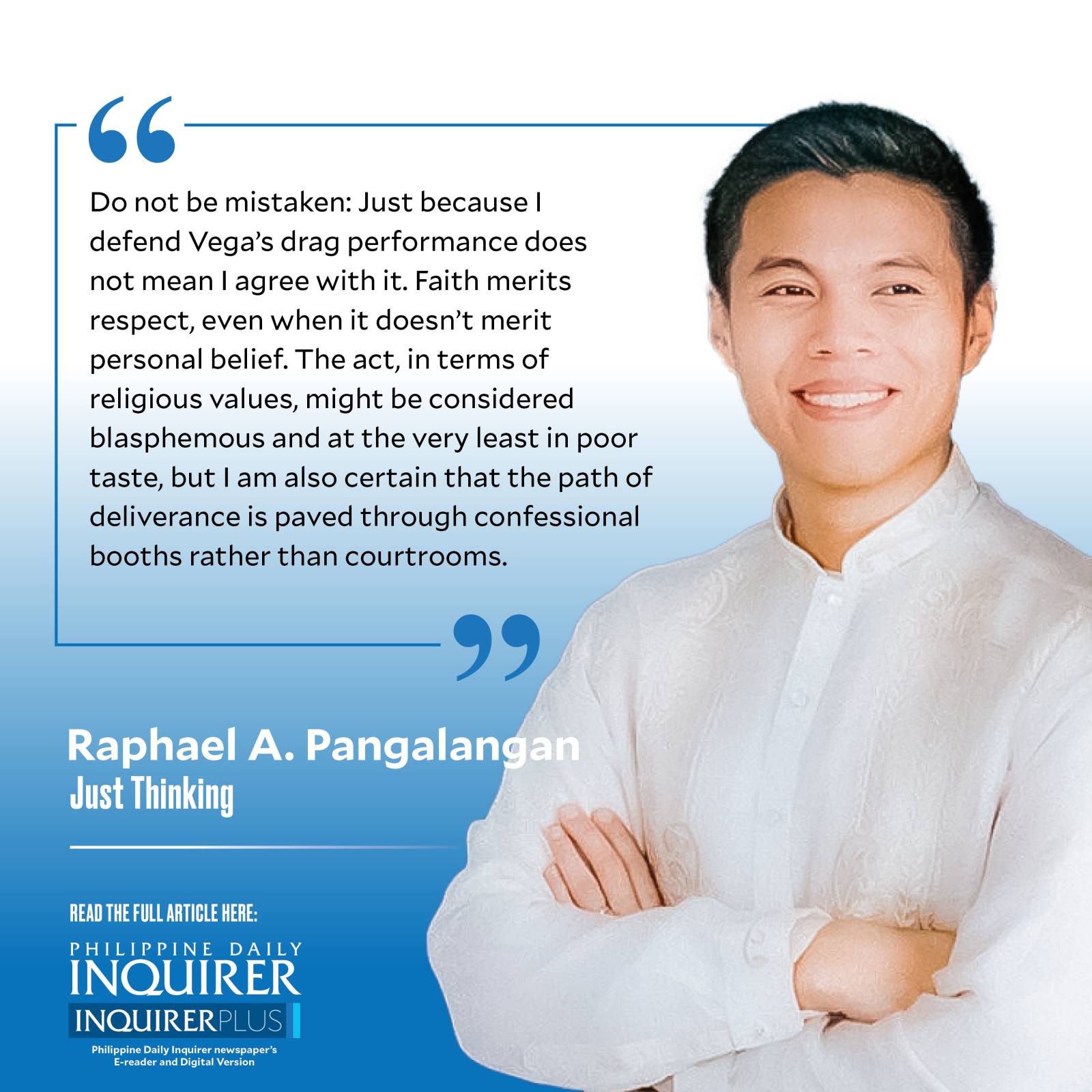How fickle thy faith

By now, the lot of us are all too familiar with the religious controversy of our time. If the 2010’s had the “Poleteismo” by Mideo Cruz, the 2020’s has the performance of Pura Luka Vega. Clad in braided wig and Nazarenian regalia, Vega sang and danced in the image of “drag Jesus.”
Was the performance wrong? Perhaps.
Article continues after this advertisementOffensive? Depending on who you ask, maybe.
But was it criminal? Most definitely not! At least it shouldn’t be.
Yet the Philippines for Jesus Movement (PJM) would take a different stance, asserting that Vega’s performance violated Article 201 of the Revised Penal Code (RPC)—immoral doctrines, obscene publications and exhibitions, and indecent shows. It is an intriguing juxtaposition: While Vega claims the drag performance was personal “penitence,” the PJM turns to the state to uphold its religious worldview and chastise Vega.
Article continues after this advertisementHave these bible-readers learned nothing? After all, as they should know even better than I, crucifixion tends to make martyrs out of minorities.
Strategically speaking, approaching this debate through the lens of law was to choose to tread the difficult path. Within the realm of faith, PJM was free to point fingers, condemn vehemently, and claim that Vega’s soul was no lighter than a feather. However, before the courts of law, the rules are different. Vega enjoys the presumption of innocence, and the prosecution is burdened with proof. PJM would have been much better off simply sticking to their faith. Call a spade a spade and sin as a sin.
From a human rights perspective, that is something PJM is, in fact, entitled to. We often compare religious prejudice with other forms of bigotry—racial, ethnic, national. What blows over our heads, however, is how unlike any of these other categories, religion is inherently discriminatory. There is no way one can be a good Catholic monist, yet in that same breath regard the belief in Islam, Hinduism, or Taoism to be correct. There is nothing inherently hierarchical or exclusionary about the color of our skin or the flags that we salute, yet in religion, to believe in one is to exclude all others.
(Now perhaps one might hypothesize a multifaith—one where Allah, Lao Tzu, Vishnu, and Yahweh have a seat at the table. To this, I say: Congratulations, you’ve proselytized and created your own religion. You’re not a Catholic-Islam-Hindi-Taoist all at once. You are each of them and thus none of them.)
Passing judgment on Vega hinges on the exercise of religious freedom, a constitutional right safeguarded under Section 5 of the Bill of Rights. Yet here lies the dilemma: PJM realizes that what is sauce for the goose is sauce for the gander. Their religious freedom coincides with Vega’s religious expression.
PJM thus looks to the state for its salvation, yet fails to acknowledge how the state’s hands are tied. The very same provision of the Bill of Rights provides: “No law shall be made respecting an establishment of religion.” The separation of church and state preempts the government from dabbling into the religious sphere, even if to protect religion and religious feelings.
(As an aside: Why then does a secular state like the Philippines have the likes of Article 201 and, more so, Article 133 (on the crime of offending religious feelings) in its books? This is neither necessarily the product of experience nor discretion. Alas, it is a product of an accident in history. The RPC, where these laws are found enshrined, is inherited from Spain’s Código Penal, which was partially anglicized as the country switched colonial hands from Spain to the United States. The US, in turn, extended its political legal structure to the Philippines (that is, the vertical relationship between state and people) but stayed hands when it came to municipal law (that is, the horizontal relationship governing between and among the people). We inherited the RPC from Spain, and the Constitution from the US. It is for this historical and colonial reason that our religious-legal structure is one of paradox.)
PJM claims that Vega’s performance was “very damaging” to the faith of the Filipino people. I ask: How fickle is thy faith? If this was indeed a crime against faith, then let it be adjudged within the realm of faith as well. Sins are matter of the soul, and not for the state.
Do not be mistaken: Just because I defend Vega’s drag performance does not mean I agree with it. Faith merits respect, even when it doesn’t merit personal belief. The act, in terms of religious values, might be considered blasphemous and at the very least in poor taste, but I am also certain that the path of deliverance is paved through confessional booths rather than courtrooms.
PJM may have filed a complaint with the courts, but it must also petition the heavens. The secular and sectarian solutions are not the same. May the Lord grant us the wisdom to know the difference.
—————-
thinkjustly@gmail.com
















